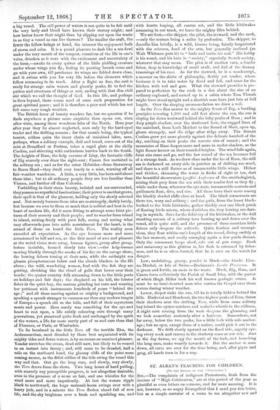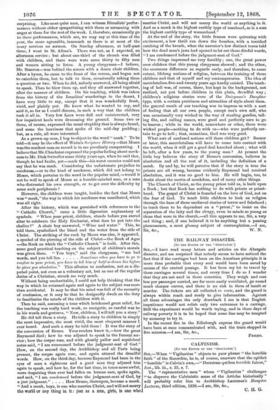ST. ALBAN'S TEACHING FOR CHILDREN.
(To THE EDITOR OF THE SPECTATOR...)
Sin,—The complaints of indignant Protestants, fresh from the incense of " High Celebration," are at this period of the year as plentiful as even letters on sermons, and far more amusing. It is hot, however, as an angry Evangelical that 1 send you this letter, but as a simple narrator of a scene to me altogether new and
surprising. Like most quiet men, I can witness Ritualists' perfor- mances without either sympathizing with them or screaming with anger at them for the rest of the week. I, therefore, occasionally go to these performances, which are, we may say at this time of the year, the more agreeable, inasmuch as there is at most of the many services no sermon. On Sunday afternoon, at half-past three, •I went to St. Alban's. There was not, as I expected, an afternoon service ; but about one-third of the church was filled with children, and there were were some thirty to fifty men and women sitting to listen. A young clergyman—I believe, Mr. Stanton—was behind the screen with a dozen choir children. After a hymn, he came to the front of the screen, and began not to catechize them, but to talk to them, occasionally asking them a question or two. When he did, nobody answered, all being afraid to speak. Then he blew them up, and they all answered together, after the manner of children. On his teaching, which was taken from the history of the Israelites' wanderings in the desert, I have very little to say, except that it was wonderfully fresh, vivid, and plainly put. He knew what he wanted to say, and said it, so far as I could discern, in such a way that the children took it all in. Very few faces were dull and uninterested, very few impatient heels were drumming the ground. Some two or three, of course, expressed the usual stupidity that is always found, and some the heaviness that spoke of the mid-day pudding ; but, as a rule, all were interested.
As a grown-up man, I beg to object to the word " meek." To be told—it may be the effect of Watts's Scripture History —that Moses was the meekest man on record is to me peculiarly exasperating. 1 believe that Mr. Chuckater expressed the popular feeling about meek- ness to Mr. Dick Swiveller some thirty years ago, when he said that, though he had faults, yet—mark this—his worst enemies could not say that he was meek. Considering the unfortunate prejudice to meekness,—or to the kind of meekness, which did not belong to Moses, which pertains to the word in the popular mind,—would it not be well to speak of Moses as a humble-minded man, or a man who distrusted his own strength, or to get over the difficulty by some such periphrasis ?
However, the children were taught, besides the fact that Moses was " meek," the way in which his meekness was manifested, which was all right.
After the history, which was garnished with references to the " Catholic Church," came a little digression explanatory of symbols. " When your priest, children, stands before you sacred altar to celebrate the Holy Eucharist, what does he put into the chalice ?" A choir boy answered, "Wine and water." This, he told them, symbolized the blood and the water from the side of Christ. The striking of the rock by Moses was also, it appeared, a symbol of the piercing of the side of Christ—the Rock of Ages —the Rock on which the " Catholic Church " is built. After this, some good practical teaching on the subject of children's morals was given them. " You boys," said the clergyman, " use bad words, and you tell lies Sometimes when you have to go to confess to your priest, you have to tell him of half-a-dozen lies before he gives you absolution." This allusion to confession, not as a dis- puted point, not even as a voluntary act, but as one of the regular duties of a Christian, struck me very much.
Without being uncharitable, I could not help thinking that the way in which he returned again and again to the subject was more than accidental. It may be that his mind was full of the necessity of confession, or it may be that he designedly dwelt on the duty to familiarize the minds of the children with it.
Then he said, assuming a tone which betokened great relief, for the teaching was really hard work, so energetic, so careful was he in his words and gestures, " Now, children, I will tell you a story."
He did tell them a story. He tells a story to children in simply the most impressive, the most vivid, the most eloquent manner I ever heard. And such a story he told them ! It was the story of the conversion of Bruno. Your readers know it,—how the great Raymond died ; how he was adjured to speak in the funeral ser- vice; bow the corpse rose, and with ghastly pallor and sepulchral notes said, "I am summoned before the judgment-seat of God." How, on the second day, the Archbishop and all Paris being present, the corpse again rose, and again uttered the dreadful words. How, on the third day, because Raymond had been in the eyes of man a righteous and a good man they adjured him again to speak, and how he, for the last time, in tones more awful, more despairing than ever had fallen on human ears, spoke again, and said, " I am condemned before the judgment-seat of God, by a just judgment." . . . . How Bruno, thereupon, became a monk. "And a monk, boys, is one who marries Christ, and will not marry the world or any thing in it : just as a nun, girls, is one who
marries Christ, and will not marry the world or anything in it. And as a monk is the highest earthly type of manhood, so is a nun the highest earthly type of womanhood."
At the end of the story, the little frames were quivering with excitement, a low thrill ran down the benches, with a terrified catching of the breath, when the narrator's low distinct tones told how the dead man's jaws had opened to let out those direful words, " I am condemned before the judgment-seat of God."
Two things impressed me very forcibly ; one, the great power over children that this young clergyman showed ; and the other, the enormous difference as regards early, and therefore, to some extent, lifelong notions of religion, between the training of these children and that of myself and my contemporaries. The idea of sacerdotalism five-and-twenty years ago hardly existed. The teach- ing of hell was, of course, there, but kept in the background, not realized, not put before children in this plain, dreadful way ; children's religious stories were of the Dairyman's Daughter type, with a certain prettiness and attraction of style about them. the general result of our teaching was to impress us with a sort of feeling that all our own people, except one's own self, who was occasionally very wicked in the way of stealing goodies, tell- ing fibs, and calling names, were good and perfectly sure to go to heaven ; while in the world, somewhere or other, there were wicked people—nothing to do with us—who were perfectly cer- tain to go to hell ; that, meantime, God was very good.
What sort of confused notions will these children get? Sooner or later, this sacerdotalism will have to come into contact with the world, when it will get a good deal knocked about ; what will be left, after a few years, to the young man ? At present the little boy believes the story of Bruno's conversion, believes in absolution and all the rest of it, including the definition of a monk. By and by, he will perceive that if the story is true the priests are all wrong, because evidently Raymond had received absolution, and it was no good to him. He will begin, too, to doubt about the merits of monkdom, and of many other things.
The Church of Christ, as the young priest told us, is built upon a Rock ; but that Rock has nothing to do with priests or priest- hood. The gospel of Christ is founded on the love of God, not on the fear of God. To teach little children to look on religion through the haze of these mediaeval stories of terror and falsehood ; to teach them to be dependent on a " priest;" to insist on the separation of the laity and the clergy, even to minds so young as those that were in the church,—all this appears to me, Sir, a very sad thing ; and, if one believed it to be anything but a passing phenomenon, a most gloomy subject of contemplation.—I am,































 Previous page
Previous page